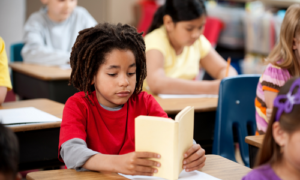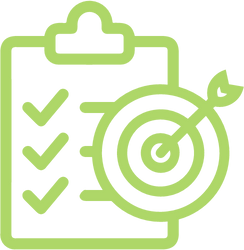Why Do Kids Get Behind in Reading?
by Alysa Craigie
“I’m stupid! I can’t read!”
That was what an eight-year-old yelled on his first day in phonics tutoring. Any child can have difficulty learning how to read. They may be able to point out letters, identify sounds, and repeat words, but there’s still something that hasn’t quite clicked yet for them. The COVID-19 pandemic certainly did not help our students, placing a critical obstacle on the early readers in kindergarten, first grade and second grade.1 Missing a year of basic reading skills has a lot of teachers playing catch-up. But many kids have been back in school full-time for over a year, so why haven’t they caught up?

Lack of Confidence
A huge issue I’ve seen in my students comes from a lack of confidence. They watch their peers read, and they know they should be reading on the same level, but they aren’t. So they lose hope and stop trying. When they’re asked to read out loud, they get embarrassed and shy away, mumble through it or act out.
Struggling students want to learn how to read, but they need encouragement and patience from the adults in their lives. Spending one-on-one time reading to or listening to kids read – and being patient when they slip up – is the best way to boost their confidence in reading.
Lack of Resources
 It goes without saying that not every family has all the resources needed to help their child with reading challenges, whether that’s money for school materials, time to help their student with school work, or the experience to help with difficult subjects.
It goes without saying that not every family has all the resources needed to help their child with reading challenges, whether that’s money for school materials, time to help their student with school work, or the experience to help with difficult subjects.
Kids that are behind in their reading skills need an extra push outside of their normal classroom. Teaching aids are a great resource, but may not be available at every school or grade level. A tutor is an excellent choice, providing someone competent in the subject to work one-on-one with your student. If that is not an option, reach out to the school to see what additional resources may be available to the students. Local libraries frequently hold reading times for kids, and the library staff will be able to point out books that kids at the same reading level love to read.
Difficulty Practicing Hard Things
 I had a student who would regularly stop our lessons to run around or tell a story, and when I would push him to finish our lesson, he would throw himself on the ground with his head buried in his arms. He wasn’t trying to be difficult – he was just frustrated. He was frustrated that he couldn’t read the story as quickly as he wanted to, and that he had to keep going even when he wanted to stop. I’d be frustrated trying to read a medical journal written in Ancient Greek. It can be just as difficult for students to read just one or two levels above their current reading level. The easiest way to help kids practice hard things is to break it up into small chunks and take breaks.
I had a student who would regularly stop our lessons to run around or tell a story, and when I would push him to finish our lesson, he would throw himself on the ground with his head buried in his arms. He wasn’t trying to be difficult – he was just frustrated. He was frustrated that he couldn’t read the story as quickly as he wanted to, and that he had to keep going even when he wanted to stop. I’d be frustrated trying to read a medical journal written in Ancient Greek. It can be just as difficult for students to read just one or two levels above their current reading level. The easiest way to help kids practice hard things is to break it up into small chunks and take breaks.
Breaking up the agenda helps give a natural end goal and will help students feel accomplished completing the individual parts of their task. It’s easy for a student to get overwhelmed when they see an entire page of scary-looking words, but if we start out with just five words, move to something else, and then come back later for another five words, it can seem less daunting.
Taking breaks gives the brain a chance to breathe and calm down before diving back in. Recognizing the start of frustration or anger is a difficult skill to learn, especially for kids. So with my students, if I notice that they are starting to get frustrated, I tell them: “I notice you seem a little frustrated. Do you want to keep going, take a break, or move to another topic and come back to this one later?” Any of those three options is acceptable for the student to choose. This allows them to notice their own feelings, and to actively choose what they think would work best for them.
Appreciate the Hard Work
 It’s easy to forget how difficult learning to read is, so give your kiddo some credit! Whether they lack confidence in their ability to read, don’t have access to the resources that will help them excel, or just generally get frustrated with hard topics, your student is resilient, smart and capable! Every child will struggle in their education at some point, and it’s important that they know they haven’t failed just because it’s tough. Celebrate those big and small victories, and encourage your student to acknowledge their wins on their own, too. This will give them the framework to push through new challenges as they continue learning through life.
It’s easy to forget how difficult learning to read is, so give your kiddo some credit! Whether they lack confidence in their ability to read, don’t have access to the resources that will help them excel, or just generally get frustrated with hard topics, your student is resilient, smart and capable! Every child will struggle in their education at some point, and it’s important that they know they haven’t failed just because it’s tough. Celebrate those big and small victories, and encourage your student to acknowledge their wins on their own, too. This will give them the framework to push through new challenges as they continue learning through life.
Breaking up the agenda helps give a natural end goal and will help students feel accomplished completing the individual parts of their task. It’s easy for a student to get overwhelmed when they see an entire page of scary-looking words, but if we start out with just five words, move to something else, and then come back later for another five words, it can seem less daunting.
Taking breaks gives the brain a chance to breathe and calm down before diving back in. Recognizing the start of frustration or anger is a difficult skill to learn, especially for kids. So with my students, if I notice that they are starting to get frustrated, I tell them: “I notice you seem a little frustrated. Do you want to keep going, take a break, or move to another topic and come back to this one later?” Any of those three options is acceptable for the student to choose. This allows them to notice their own feelings, and to actively choose what they think would work best for them.
Reading challenges are common and addressing gaps at an early age is much easier than overcoming issues related to reading difficulties in advanced grades. If your child needs help with reading, contact us to learn how we can help:





